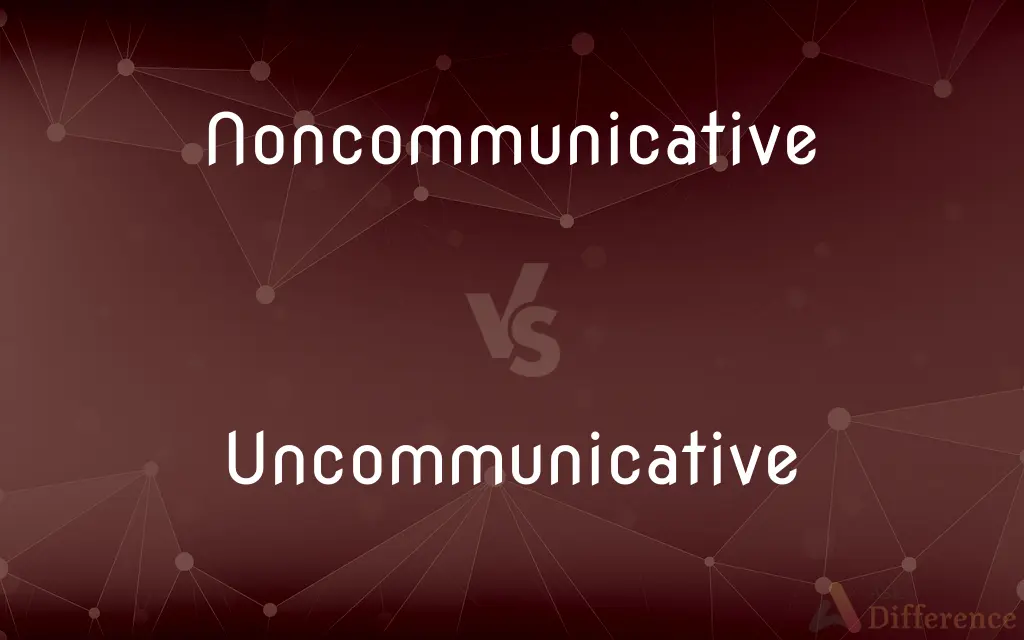Noncommunicative vs. Uncommunicative — What's the Difference?
Edited by Tayyaba Rehman — By Fiza Rafique — Updated on April 23, 2024
Noncommunicative often refers to a temporary lack of communication, while uncommunicative describes a consistent trait of not sharing thoughts or feelings.

Difference Between Noncommunicative and Uncommunicative
Table of Contents
ADVERTISEMENT
Key Differences
Noncommunicative is used primarily to describe situations or periods where someone is not communicating as usual, suggesting a deviation from their normal behavior. On the other hand, uncommunicative is more often used to describe someone’s general disposition or character, indicating a habitual reluctance to share thoughts or feelings.
When a person is described as noncommunicative, it may be due to specific circumstances or events that cause them to temporarily withhold communication. Whereas, someone who is uncommunicative may behave this way across various situations, rarely altering their approach to interaction regardless of circumstances.
The term noncommunicative can apply to both individuals and scenarios, such as meetings or negotiations where little information is shared. In contrast, uncommunicative typically applies to individuals and less frequently to describe settings or group dynamics.
It is not uncommon to see noncommunicative used in clinical or psychological contexts to describe a symptom or condition affecting communication. Conversely, uncommunicative might be used in more everyday, non-clinical contexts to discuss personality traits.
Understanding whether to use noncommunicative or uncommunicative often depends on the context of the communication issue—whether it is seen as an ongoing trait or a temporary state. This distinction can influence how relationships or behaviors are interpreted and addressed.
ADVERTISEMENT
Comparison Chart
Definition
Not communicating typically temporarily
Generally not inclined to communicate
Usage Context
Often situational or temporary
Usually describes a consistent trait
Common Associations
Events, conditions, temporary states
Personality traits, inherent behaviors
Application in Speech
Can describe behavior and scenarios
Primarily describes personal behavior
Psychological Context
More clinical or conditional applications
Less clinical, more personal disposition
Compare with Definitions
Noncommunicative
Not inclined to share information or feelings temporarily.
After the argument, she was noncommunicative the whole evening.
Uncommunicative
Reluctant to express thoughts or share information consistently.
He’s naturally uncommunicative; getting details from him is hard.
Noncommunicative
Exhibiting minimal verbal interaction.
He becomes noncommunicative when stressed.
Uncommunicative
Describing someone who rarely participates in conversations.
As an uncommunicative person, he prefers observing rather than engaging.
Noncommunicative
Lacking responsiveness to communication efforts.
The patient remained noncommunicative during the session.
Uncommunicative
Habitually silent or reserved.
Her uncommunicative nature makes social gatherings difficult for her.
Noncommunicative
Characterized by a temporary reduction in usual communication.
His noncommunicative stance during the meeting was unusual.
Uncommunicative
Generally taciturn or reticent.
His uncommunicative demeanor makes it hard to guess what he’s thinking.
Noncommunicative
Not expressing or revealing thoughts or feelings momentarily.
She was noncommunicative about her decision until the last moment.
Uncommunicative
Not forthcoming with one's thoughts or feelings.
She remained uncommunicative about her plans.
Noncommunicative
Not communicative
Uncommunicative
Not disposed to be communicative.
Uncommunicative
Characterized by reserve or a lack of expression
In an uncommunicative mood.
An uncommunicative stare.
Uncommunicative
Tending not to communicate; not communicating.
He asked and asked, but she remained silent and uncommunicative.
Uncommunicative
Not inclined to talk or give information or express opinions
Common Curiosities
How can you deal with an uncommunicative person?
Patience and creating a comfortable, non-threatening environment can encourage communication.
Is uncommunicative a personality trait?
Yes, being uncommunicative is often considered a consistent personality trait.
Can a person be both noncommunicative and uncommunicative?
Yes, someone can be generally uncommunicative but may have periods where they are even more withdrawn.
Does being noncommunicative always mean someone is upset?
Not necessarily; it could also be due to stress, concentration, or personal style of processing information.
Can uncommunicative individuals be effective leaders?
It can be challenging, but with the right strategies, they can still lead effectively by leveraging other strengths.
What are the signs of a noncommunicative individual in a professional setting?
They may avoid participation in meetings or discussions and provide minimal feedback.
What makes someone noncommunicative?
Temporary situations or emotional states can make someone noncommunicative.
Are children described as noncommunicative or uncommunicative?
Children are more often described as noncommunicative, particularly if the behavior is not typical for them.
Is it easier to change noncommunicative behavior or uncommunicative behavior?
Noncommunicative behavior, being often situational, is generally easier to address than uncommunicative traits.
How does uncommunicative behavior affect relationships?
It can lead to misunderstandings and feelings of distance or frustration among partners.
Share Your Discovery

Previous Comparison
Rat vs. Hamster
Next Comparison
Baptist vs. LutheranAuthor Spotlight
Written by
Fiza RafiqueFiza Rafique is a skilled content writer at AskDifference.com, where she meticulously refines and enhances written pieces. Drawing from her vast editorial expertise, Fiza ensures clarity, accuracy, and precision in every article. Passionate about language, she continually seeks to elevate the quality of content for readers worldwide.
Edited by
Tayyaba RehmanTayyaba Rehman is a distinguished writer, currently serving as a primary contributor to askdifference.com. As a researcher in semantics and etymology, Tayyaba's passion for the complexity of languages and their distinctions has found a perfect home on the platform. Tayyaba delves into the intricacies of language, distinguishing between commonly confused words and phrases, thereby providing clarity for readers worldwide.















































